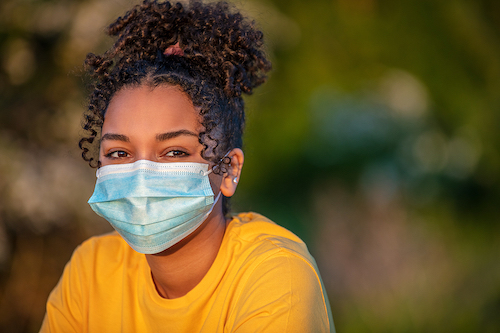 Levels of anxiety among young people in Britain doubled during the early days of the COVID-19 pandemic and first lockdown.
Levels of anxiety among young people in Britain doubled during the early days of the COVID-19 pandemic and first lockdown.
Researchers say the findings could have implications for young people around the world grappling with the same challenges during COVID-19.
“The results provide an early indication that a worrying rise in anxiety in young people could be ongoing far beyond periods of lockdown,” Rebecca Pearson, PhD lead author of the study and Lecturer in Psychiatric Epidemiology at the University of Bristol told Theravive.
The study used data from Bristol’s Children of the 90s health study. As part of that study 14,500 pregnant mothers were recruited in 1991 and 1992 and nearly three decades of health and lifestyle data of the mothers and their babies has been collected. The babies who were involved in the study will all soon be turning 30.
For this specific study, the researched compared the participants’ data from previous years with the data collected in two 2020 COVID-19 questionnaires.
They found that young people aged between 27-29 experienced double the amount of anxiety (13 per cent to 24 per cent) in the early staged of the pandemic and lockdown. This anxiety was higher than that felt by their parents.
The data showed that the anxiety experienced by this group continued to remain high even when restrictions lifted in June.
“In young people (under 30) there was evidence for higher than expected levels of anxiety, both at the start of UK lockdown and as restrictions eased. This was not the case for older people. Interestingly the rise in mental health symptoms was limited to Anxiety and no increase was found in depression,” Pearson said.
“COVID-19 and associated public health measures are like nothing this generation has experienced before. Uncertainty about health, finances and social structures as well as disruptions to routine are all likely to impact mental health, but the truth is we just don't know to what extent, how and who is at risk. Data from studies which have mental health data from before the pandemic are key to understanding mental health changes and thus it was key to include a mental health survey in the Children of the 90s and Generation Scotland cohorts during the pandemic and compare this to previous data.”
The researchers identified certain groups were at an increased risk of higher levels of anxiety and depression during the pandemic, even when taking into account their previous history with mental health issues.
Women, people living with pre-existing conditions both physical and mental, those who lives alone, those who were self-isolating due to COVID-19 and those who had experienced recent financial problems were all at risk of increased anxiety or depression.
Some of these things, like living alone, were only linked with greater depression while others, like being a parent, were only linked to anxiety.
The researchers are now examining why some people have poorer mental health during COVID-19 and the role factors like exercise, sleep and worrying play in this.
“We are exploring the nature of worries surrounding the pandemic (for example worries about not seeing family and friends, or financial concerns or concerns about getting the virus) and the extent to which these are important in predicting later mental health risk. We are also exploring the impact of the pandemic in young children and their parents and the protective role of keeping a routine,” Pearson said.
Although based on young people in Bristol, Pearson said the findings of the study will be relevant for policy makers around the world grappling with the impact of the pandemic and lockdowns on their populations.
She says the study highlights the important for widely available mental health services and resources.
“Mental health should be monitored and increased resources provided for mental health services. Preventative messages and self-help resources for reducing stress and anxiety such as guidance for mindfulness or relaxation techniques should be easily accessible and promoted. Social support for those who live alone such as social bubbles may also be important.”
Elizabeth Pratt is a medical journalist and producer. Her work has appeared on Healthline, The Huffington Post, Fox News, The Australian Broadcasting Corporation, The Sydney Morning Herald, News.com.au, Escape, The Cusp and Skyscanner. You can read more of her articles here. Or learn more about Elizabeth and contact her via her LinkedIn and Twitter profiles.